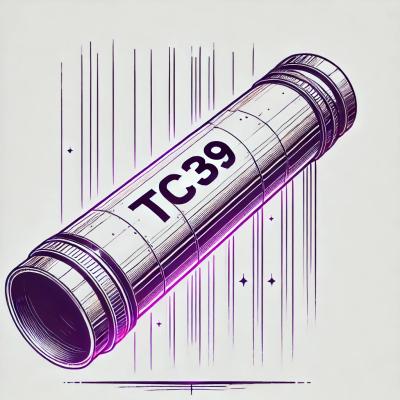
Security News
NVD Quietly Sweeps 100K+ CVEs Into a “Deferred” Black Hole
NVD now marks all pre-2018 CVEs as "Deferred," signaling it will no longer enrich older vulnerabilities, further eroding trust in its data.
The c42eventextractor package provides modules that assist in the retrieval and logging of Code42 security events and
alerts. This is done by exposing handlers that allow developers to supply custom behaviors to occur when retrieving
events. By default, the extractors will simply print their results to stdout, but these handlers can be extended to
allow developers to record the event info to whatever location or format they desire.
Install c42eventextractor using pip:
You can install the c42eventextractor package from PyPI, from source, or from distribution.
The easiest and most common way is to use pip:
pip install c42eventextractor
To install a previous version of c42eventextractor via pip, add the version number. For example, to install version
0.2.9, you would enter:
pip install c42eventextractor==0.2.9
Visit the project history on PyPI to see all published versions.
Alternatively, you can install the c42eventextractor package directly from source code:
git clone https://github.com/code42/c42eventextractor.git
When it finishes downloading, from the root project directory, run:
python setup.py install
If you want create a .tar ball for installing elsewhere, run this command from the project's root directory:
python setup.py sdist
After it finishes building, the .tar ball will be located in the newly created dist directory. To install it, enter:
pip install c42eventextractor-[VERSION].tar.gz
To get all security events, use the FileEventExtractor:
from c42eventextractor.extractors import FileEventExtractor
from c42eventextractor import ExtractionHandlers
import py42.sdk
code42_sdk = py42.sdk.from_local_account(
"https://example.authority.com",
"admin@example.com",
"password",
)
handlers = ExtractionHandlers()
# Add implementations for customizing handling response and getting/setting insertion timestamp cursors:
def handle_response(response):
pass
def record_cursor_position(cursor):
pass
def get_cursor_position():
pass
handlers.handle_response = handle_response
handlers.record_cursor_position = record_cursor_position
handlers.get_cursor_position = get_cursor_position
extractor = FileEventExtractor(code42_sdk, handlers)
extractor.extract()
# To get all security events in a particular time range, provide an EventTimestamp filter.
# Note that if you use `record_cursor_position`, your event timestamp filter may not apply.
from py42.sdk.queries.fileevents.filters import EventTimestamp
time_filter = EventTimestamp.in_range(1564694804, 1564699999)
extractor.extract(time_filter)
# If your timestamps are in string format, you can convert them by doing:
from datetime import datetime
begin_date_string = "21 June, 2020"
end_date_string = "22 June, 2020"
begin_date = datetime.strptime(begin_date_string, "%d %B, %Y")
end_date = datetime.strptime(end_date_string, "%d %B, %Y")
begin_timestamp = (begin_date - datetime.utcfromtimestamp(0)).total_seconds()
end_timestamp = (end_date - datetime.utcfromtimestamp(0)).total_seconds()
time_filter = EventTimestamp.in_range(begin_timestamp, end_timestamp)
extractor.extract(time_filter)
# You can put filters in an iterable and unpack them (using the `*` operator) in the `extract()`
# method. This is a common use case for programs that need to conditionally build up filters.
from py42.sdk.queries.fileevents.filters import DeviceUsername, FilePath
_NEEDS_DEVICE_USERNAME_FILTER = False
_NEEDS_FILE_PATH_FILTER = True
filters = []
if _NEEDS_DEVICE_USERNAME_FILTER:
filters.append(DeviceUsername.eq("test.user@example.com"))
if _NEEDS_FILE_PATH_FILTER:
filters.append(FilePath.is("path/to/file"))
extractor.extract(*filters)
Getting alerts is similar to getting security events, use the AlertExtractor with appropriate alert filters from the
py42.sdk.queries.alerts.filters module:
from c42eventextractor.extractors import AlertExtractor
from py42.sdk.queries.alerts.filters import AlertState
# set up your sdk and handlers here
extractor = AlertExtractor(code42_sdk, handlers)
open_filter = AlertState.eq(AlertState.OPEN)
extractor.extract(open_filter)
The default behavior of the extractor is to "AND" all filter groups that get passed in for extraction. If you want to
construct an "OR" query between multiple filters, you can set the .use_or_query attribute on the
extractor instance and it will convert the query to "OR" all filters except those in the .or_query_exempt_filters
list. This list by default contains all of the timestamp filter classes (as using "OR" with a timestamp filter negates any
other filter categories). If you need to exclude any other specific filters from the "OR" group and keep them in the "AND"
part of the query, you can append either the base filter class (which will exempt any instance of that type of query from the
"OR" query), or pass in a constructed filter with value(s) to only exclude that exact filter from the "OR" group.
Example to "OR" two filters (FileName and FileSize) but keep the whole query restricted to only Exposure events:
extractor = FileEventExtractor(code42_sdk, handlers)
file_name_filter = FileName.eq("document.txt")
file_size_filter = FileSize.greater_than(1024*1024*1024)
exposure_event_filter = ExposureType.exists()
# convert to OR query
extractor.use_or_query = True
# make sure the exposure_event_filter is included in the "AND" group
extractor.or_query_exempt_filters.append(exposure_event_filter)
extractor.extract(file_name_filter, file_size_filter, exposure_event_filter)
OR queries can be done with both the FileEventExtractor and AlertExtractor.
A basic set of handlers is provided in the c42eventextractor.extraction_handlers.ExtractionHandlers class.
These default to printing the response data and any errors to the console and stores cursor position in memory.
c42eventextractor also provides some common logging and formatting implementations that you may find useful for
reporting on security data.
For example, to extract and submit file events to a syslog server in CEF format, use the below as your
handle_response implementation:
import json
import logging
from c42eventextractor.logging.handlers import NoPrioritySysLogHandler
from c42eventextractor.logging.formatters import FileEventDictToCEFFormatter
my_logger = logging.getLogger("MY_LOGGER")
handler = NoPrioritySysLogHandler("examplehostname.com")
handler.setFormatter(FileEventDictToCEFFormatter())
my_logger.addHandler(handler)
my_logger.setLevel(logging.INFO)
def handle_response(response):
events = json.loads(response.text)["fileEvents"]
for event in events:
my_logger.info(event)
To customize processing of results/errors further, or to persist cursor data to a location of your choosing, override
the methods on the provided handlers or create your own handler class with the same method signature as
c42eventextractor.extraction_handlers.ExtractionHandlers.
Because extractors automatically check for cursor checkpoints from the provided handlers, if the .extract() method
is called with the same filter classes used to store the checkpoint position (DateObserved for alerts and
InsertionTimestamp for file events), an exception will be raised if a cursor checkpoint already exists, as the
extractor will automatically add its own timestamp filter to the query.
c42eventextractor includes mappings from JSON field names to common event format (CEF). These formatters are available
by importing the c42eventextractor.logging.formatters module. To create a logger that logs file events in CEF format
to a file, follow this guide:
import logging
from c42eventextractor.logging.formatters import FileEventDictToCEFFormatter
formatter = FileEventDictToCEFFormatter()
handler = logging.FileHandler("output.txt", delay=True, encoding="utf-8")
logger = logging.getLogger("extractor_logger")
handler.setFormatter(formatter)
logger.addHandler(handler)
logger.setLevel(logging.INFO)
The following tables map the data from JSON field names to CEF as well as forensic search field names.
The table below maps JSON fields, CEF fields, and Forensic Search fields to one another.
| JSON field | CEF field | Forensic Search field |
|---|---|---|
| actor | suser | Actor |
| cloudDriveId | aid | n/a |
| createTimestamp | fileCreateTime | File Created Date |
| deviceUid | deviceExternalId | n/a |
| deviceUserName | suser | Username (Code42) |
| domainName | dvchost | Fully Qualified Domain Name |
| eventId | externalID | n/a |
| eventTimestamp | end | Date Observed |
| exposure | reason | Exposure Type |
| fileCategory | fileType | File Category |
| fileName | fname | Filename |
| filePath | filePath | File Path |
| fileSize | fsize | File Size |
| insertionTimestamp | rt | n/a |
| md5Checksum | fileHash | MD5 Hash |
| modifyTimestamp | fileModificationTime | File Modified Date |
| osHostName | shost | Hostname |
| processName | sproc | Executable Name (Browser or Other App) |
| processOwner | spriv | Process User (Browser or Other App) |
| publicIpAddress | src | IP Address (public) |
| removableMediaBusType | cs1 (Code42AEDRemovableMediaBusType) | Device Bus Type (Removable Media) |
| removableMediaCapacity | cn1 (Code42AEDRemovableMediaCapacity) | Device Capacity (Removable Media) |
| removableMediaName | cs3 (Code42AEDRemovableMediaName) | Device Media Name (Removable Media) |
| removableMediaSerialNumber | cs4 | Device Serial Number (Removable Media) |
| removableMediaVendor | cs2 (Code42AEDRemovableMediaVendor) | Device Vendor (Removable Media) |
| sharedWith | duser | Shared With |
| syncDestination | destinationServiceName | Sync Destination (Cloud) |
| url | filePath | URL |
| userUid | suid | n/a |
| windowTitle | requestClientApplication | Tab/Window Title |
| tabUrl | request | Tab URL |
| emailSender | suser | Sender |
| emailRecipients | duser | Recipients |
See the table below to map exfiltration events to CEF signature IDs.
| Exfiltration event | CEF field |
|---|---|
| CREATED | C42200 |
| MODIFIED | C42201 |
| DELETED | C42202 |
| READ_BY_APP | C42203 |
| EMAILED | C42204 |
FAQs
Utilities to extract and record Code42 security events
We found that c42eventextractor demonstrated a healthy version release cadence and project activity because the last version was released less than a year ago. It has 1 open source maintainer collaborating on the project.
Did you know?

Socket for GitHub automatically highlights issues in each pull request and monitors the health of all your open source dependencies. Discover the contents of your packages and block harmful activity before you install or update your dependencies.

Security News
NVD now marks all pre-2018 CVEs as "Deferred," signaling it will no longer enrich older vulnerabilities, further eroding trust in its data.

Research
Security News
Lazarus-linked threat actors expand their npm malware campaign with new RAT loaders, hex obfuscation, and over 5,600 downloads across 11 packages.

Security News
Safari 18.4 adds support for Iterator Helpers and two other TC39 JavaScript features, bringing full cross-browser coverage to key parts of the ECMAScript spec.